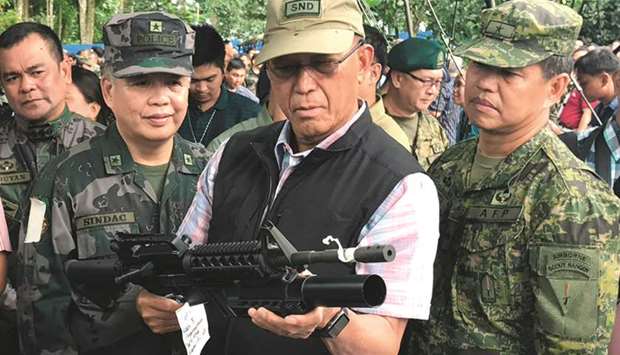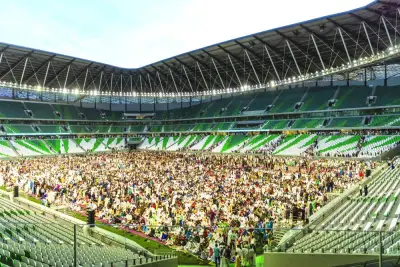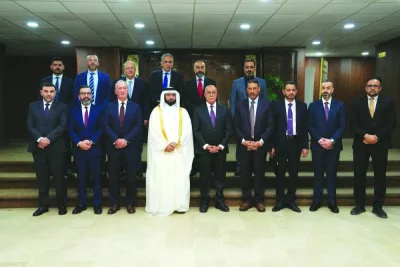Islamist militants fighting government troops in Marawi in the southern Philippines are holding about 100 hostages, the army said yesterday, even as it predicted that the crisis in the besieged city was nearing an end.
Troops have “paralysed” the logistics of more than 200 militants holed up in Marawi City, 800km south of the capital Manila, for more than two weeks, military officials said.
The gunmen, who come from different groups that pledge allegiance to the Islamic State terrorist movement, are hiding in buildings and houses in three districts of Marawi, said Major General Carlito Galvez, a regional military commander.
Troops have captured one of the militant strongholds that leads to the centre of the city, Galvez said.
“We found food, improvised explosive devices and mobility assets. Considering that we have already paralysed the logistics capability, we are looking at the possibility that the end will be near,” he added.
Galvez said the militants were holding “more or less 100 hostages”, including a Catholic priest.
The priest is still alive, and troops were doing their best to rescue him and the other hostages, said Brigadier General Rolando Bautista, commander of the military task force in Marawi.
“The rescue of the civilians is parallel to the destruction of the local terrorist group,” he said.”Our timetable is within four days.”
The fighting in Marawi City began on May 23, when hundreds of militants went on a rampage after government forces attempted to arrest a local Islamic State leader.
More than 190 people have been killed in the violence, including 134 militants, eight of whom were foreigners, the military said.
The hostilities have also displaced more than 220,000 residents, government officials said.
President Rodrigo Duterte has declared martial law in the southern region of Mindanao to boost the fight against the militants, who were allegedly fighting with an estimated 40 foreign jihadists.
The eight foreign fighters killed in the military offensive came from Indonesia, Malaysia, Saudi Arabia, Yemen and Chechnya, officials said.
On Thursday, Indonesian police said they arrested a man suspected of helping militants travel to the southern Philippines and Turkey.
National police spokesman Martinus Sitompul said that the suspect helped fund trips by four Indonesian militants now wanted by Philippine authorities for alleged involvement in the siege of Marawi City.
He also sent $7,500 to the Philippines to fund the militants’ activities there, Sitompul said.
The Philippine government is already “preparing a rehabilitation programme for Marawi” to be implemented once troops “clear the last pocket of resistance” of the militants, Defence Secretary Delfin Lorenzana said.
“We would like Marawi to go back to normal,” Lorenzana told reporters on a visit to the southern city. “Children can go back to school and businesses will start... and the banks as well.”
Photos from rescue teams able to enter the conflict area showed the massive destruction from the fighting: dozens of buildings either torched or shattered by artillery fire or bombs, their roofs torn off.
Crushed cement, twisted steel and iron sheets littered the streets, while many electricity posts were toppled, with some crashing onto abandoned vehicles.
One local politician has been arrested and others are wanted for supporting Islamist militants who have taken over parts of a southern Philippine city, authorities said yesterday.
Nearly 200 people have been reported killed since militants flying black flags of the Islamic State group went on a rampage in Marawi, the main Muslim city in the predominantly Catholic Philippines, on May 23.
While much of the focus has been on the hundreds of gunmen reportedly involved, authorities said yesterday that they had been receiving support from local politicians and residents.
“It’s a combination of names of politicians, private citizens and members of Maute, the leaders,” military chief of staff General Eduardo Ano said on ABS-CBN television as he discussed a list of about 200 people wanted for helping the gunmen.
Maute is one of the main militant groups, named after brothers with that surname who are from the region and are believed by the military to be among those still holed up in pockets of the city protected by human shields.
In what the military said was a significant development, ex-Marawi mayor Fahad Salic was arrested on charges of rebellion on Wednesday in another part of the southern Philippines.
“Even before the Marawi crisis, there were reports that he was a staunch supporter, he’s providing logistics and finances during the formative years of this Maute-ISIS group,” regional military spokesman Brigadier General Gilbert Gapay told reporters.
The military also hailed the capture on Tuesday of the father of the Maute brothers in the southern city of Davao, President Rodrigo Duterte’s hometown about 190km from Marawi.
“As the patriarch of the Maute clan, Mr Cayamora Maute is considered as one of the brains of the Maute-ISIS terror group,” Gapay said.
The elder Maute was brought to Manila, more than 800km from Marawi, yesterday because of the possibility militants may try to break him out of jail in the south, Gapay said.
Mindanao has been plagued for decades by a Muslim separatist insurgency, which has claimed more than 120,000 lives and condemned many parts of the region to be ruled by corrupt warlords.
The main rebel organisations are seeking to broker a final peace accord with the government.
But the Maute and other small hardline groups are not interested in peace and have in recent years sought to unite under IS.

Philippines Defense Secretary Delfin Lorenzana inspects a firearm seized from militants.


